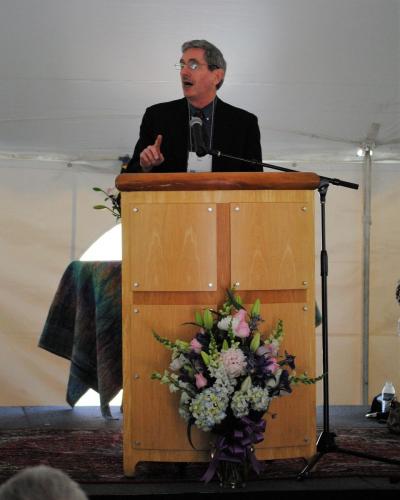May 11, 2018
Recognition and Gratitude for Andover Newton Trustees Offered by Prof. Mark Heim
Celebration of the Beloved Community
May 11, 2018
The following is a transcript of Mark’s reflection from May 11th, 2018.
In the Andover Newton story trustees are the true volunteers. How many times, in the midst of demanding and difficult problems for our school—problems that required so much time and energy and commitment– have I looked around a room and thought this: “Yes, we faculty, staff and administration, we have to be here. It is our institution, our jobs. This struggle is what we are being paid for, or at least, it is about preserving the fact that we are being paid! But these other women and men, up to their necks in our work–no less faithful and passionate and concerned—they are here by choice. They are volunteers.
They have day jobs and other primary responsibilities. In virtually all cases those jobs are consuming and demanding on their own. And yet they made this school their cause. In the biblical sense, they committed to make its concerns their own, to weep with it, rejoice wih it, and to give it the care that normally belongs only to one’s own family or career.
Perhaps there are institutions where trusteeship means attending a few meetings, voting the motions, writing a check, and doing it all again next year. In the entire time I have known Andover Newton…and perhaps contrary to what some of them were told when they were first recruited onto the board….I have never known a time when that was the case for trustees here.
I think of moments of special extremity, when the trustees literally held the school in their hands
In just under three years, 1987—1990, Andover Newton suffered in quick succession, the deaths first of its then Dean, Orlando Costas, then the death of the chair of the board of trustees, then the death of the President, George Peck, and then the death of a beloved faculty member, Jane Cary Peck. Let that sink in.
If the trustees at that time had not taken an “all hands on deck,” “over and above” commitment, this place might not have survived, or survived in recognizable form. And what I remember best from that time was not just the trustees digging in to see that the ship continued to function and to recover….I remember the trustees mourning with us, praying with us, consoling and inspiring us. It was the worst, but it was also the best, the way losses can sometimes bring you together and focus on what’s important and appreciate each other.
We thank you for all the times you have saved the ship.
It is notorious that boards of trustees and faculties at institutions often do not get along. It is easy for each to see the whole picture of the school in somewhat different ways, so that the problem happens to lie mainly in the other body. I can say that that has only ever been the case here once in my 36 years, one time when the crisis was of our own making and brought the trustees and faculty into conflict on opposite sides. And even that case, if I may put it that way, was a “good fight,” in the sense that it was conducted honestly and directly and with civility. So relations that had been good before, went back to being just as good or better afterwards…..and between the same people (almost all the same people). And that is probably an even more exceptional event than a long spell of calm weather.
We thank you that, at the end of the day, you have never seen this organization as us and them, but always as we.
One reason I think that harmony has been the normal state is that there has never been a division between the faculty and the trustees over the mission of this school. How to carry it out, sometimes? How to resource it, perhaps. How to refit it for new conditions, naturally. But that we are here out of faith, to train leaders of faith, for communities of faith, is the calling that they hold before us as much as we before them. And that is so because these faithful volunteers come from the front lines of that faith-work themselves, in their personal lives and in the organizations where they hold their day jobs.
We thank you for staying the course, and for keeping us on course.
Many years ago the general secretary of my denomination likened his role at the head of that organization to the lower pot in a double boiler. You know a double boiler has the pot below with the water, and a pot that sits above with the food. He said in his position he was always in between, he always felt the heat, and he never knew what was cooking.
The job of trustees is a little bit like that, in that the it is very rare that when someone takes the job of trustee they know the most momentous task that they will come to face.
The trustees in 1987-1990 did not know they were going to need to right a decapitated institution. The trustees in the mid-1990s did not know that they had signed on to weather and reconcile an internal conflict. The trustees at the turn of this century, who undertook to sell of a portion of the campus for development, had no idea they would end up midwifing a first of its kind partnership of Jewish and Christian institutions in interfaith education. And the trustees four or five years ago, who devoted themselves to facing up to unavoidable decisions about this institution did not know that this current plan was the vision they would be implementing.
But in all those cases they were more than faithful.
For that faithfulness and commitment we are most grateful and wish to thank you all.

